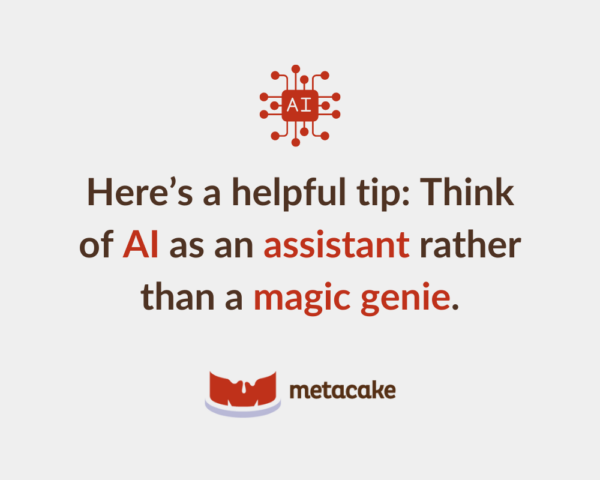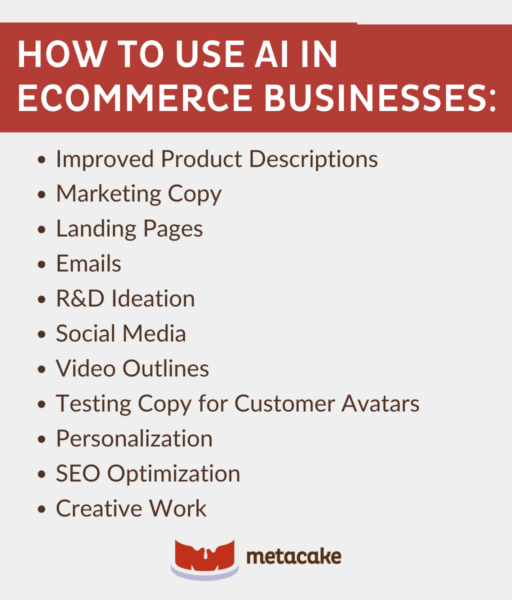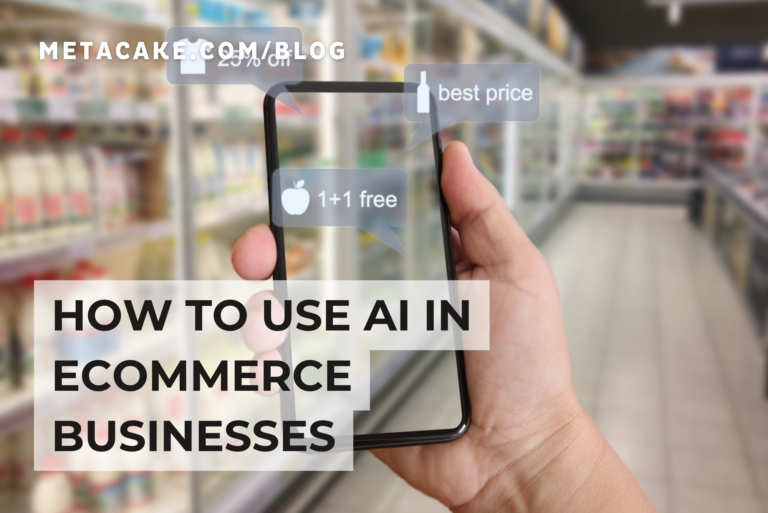The impact of AI on various industries has been increasing at an exponential rate. While still in its early stages, AI has already started transforming how business is conducted across many sectors. One space that has the potential to see a major impact is ecommerce and digital marketing.
For many people so far, AI has seemed like a fun novelty to experiment with. Chatbots, creative content generation, and predictive analytics using machine learning have all captured our attention and imagination. But how do you practically integrate AI into your ecommerce business in an effective way?
In this post, we’ll discuss how you can use AI to improve your current ecommerce business as well as what AI might be able to help ecommerce brands accomplish in the near future.
Limitations and Misconceptions of AI
Many people assumed AI would be able to automatically generate high-quality, human-like content if prompted. For example, maybe you thought AI could crank out complete, compelling blog posts if simply given a topic. Or it could create several variations of Facebook ad copy that would beat your existing copy’s ROAS by a mile.
Here’s the thing: Feeding a broad topic to today’s AI and expecting polished written content back simply doesn’t work that smoothly yet. The output can sound stilted and robotic, or it might just feel really off-brand.
So, where does that leave things currently?
Here’s a helpful tip: Think of AI as an assistant rather than a magic genie.
Rather than thinking of AI as a human-replacing magical tool, it’s better compared to a digital assistant. An AI tool, like a human assistant, can take on helpful supplementary and supportive tasks, but it requires clear direction and management.
AI also makes for an excellent thought partner when it comes to certain constrained tasks, like generating names, summaries, outlines, and more. However, to get quality output, you have to provide quality input. It’ll need to be trained on data and information related to your business and your goals.
For ecommerce brands, this means feeding the AI with your brand identity information, target customer data, product catalog, and existing content examples like ads and emails.
With proper data inputs and ongoing accuracy verification, current AI capabilities can enhance your business processes and make them more efficient, versus aiming to fully automate complex creative and analytical workflows.

AI’s Impact on Ecommerce Marketing
It’s important to remember that one thing hasn’t changed: Great ecommerce copy — on websites and across marketing — still works. From product descriptions to ads and emails, strong copy is a key player in driving customer engagement and sales.
That creativity still needs to come from a human being, and that’ll always be the case. Things that matter in your business, like your brand’s mission, values, voice, customer avatars, etc., still need to come from the soul of your company. Otherwise, it’ll feel hollow.
But once you have all that dialed in and are able to properly convey it to a tool such as Jasper or Copy.ai, AI can become a great opportunity to streamline and scale your content production.
Rather than spending hours brainstorming and manually writing product descriptions, ad copy, emails, blog posts, and more, you and your team can be freed up to focus more on high-value work like strategy and ideation.
The key is finding the right balance between leveraging automation while still maintaining the human touch that builds brand connections.
Completely ignoring AI risks leaving you behind the technology adoption curve. But becoming over-reliant on AI for core brand voice expression could result in a hollow, robotic customer experience.

How to Use AI in Ecommerce Businesses
There are already several practical applications of AI that ecommerce businesses can benefit from if applied strategically. Let’s take a look at how to use AI to boost your ecommerce business.
1. Improved Product Descriptions
Training AI on your existing product catalog and descriptions can help optimize and refine them en masse. AI can also expand on product copy by generating additional descriptive details aimed at different target customer profiles.
2. Marketing Copy
AI tools excel at putting together first drafts of marketing copy (especially for ads) by analyzing examples of high-performing copy in your niche. This provides a starting point to then refine and optimize.
3. Landing Pages
Similar to marketing copy, AI can review your top landing pages and write new versions following the same persuasive style.
4. Emails
Maintaining a regular email marketing cadence takes consistent content creation. AI can help write the first drafts of promotional emails, newsletters, and more based on your brand voice.
5. R&D Ideation
Coming up with fresh product ideas and creative campaigns can be aided by AI-generated suggestions for new product names, themes, etc.
6. Social Media
Scheduling a steady stream of social media posts is essential today. AI can analyze your top-performing social content and draft new versions in a similarly engaging, on-brand style.
7. Video Outlines
Video has become an essential tool for ecommerce marketing, but deciding what to cover takes effort. AI tools can analyze your site content and existing videos to create video outlines covering relevant topics.
8. Testing Copy for Customer Avatars
AI excels at rapidly generating variations of copy detailing your products’ features and benefits that you can then test against different customer avatars.
9. Personalization
AI can take your core product descriptions and website content and refine them to better match different target user profiles.
10. SEO Optimization
By inputting keywords and analyzing your site and the sites of your top competitors, AI can suggest rewrites to relevant pages to improve page rankings.
11. Creative Work
Beyond just text, AI design tools can also generate product images, logos, and other visual assets.
Pro-Tip: We want to emphasize that all this will take work. To get AI content production right for your brand, you’ll need to train it on your voice, who your target customer is, what content has worked well in the past, and more.
Be patient and creative, and be open to trial and error. Eventually, it should be possible for you to get into a groove that can help increase efficiencies for your team as well as generate new exciting approaches for your content!
The Future of AI for Ecommerce
While the current applications provide ample opportunities for improved efficiency and increased creativity, there are even more promising capabilities on the horizon. Soon, AI may allow for highly dynamic and personalized ecommerce experiences adapted to each individual customer’s profile and needs in real time.
Imagine if, as soon as a visitor landed on your ecommerce site, AI could instantly customize the homepage content, product recommendations, special discounts, and more to match that particular visitor’s interests and high-intent signals.
Conversion rate optimization would become exponentially more powerful and precise if your site could tailor those key elements like copy, offers, and creative for the specific visitor rather than using a fixed one-message-fits-all approach. Ecommerce sites would transform into truly interactive, evolving experiences shaped by each user.
Work Smarter With AI — Don’t Let It Replace You
- Approach AI as an enhancement tool to boost business performance and processes rather than attempting to hand over the reins entirely to automation.
- Invest time in training AI appropriately for your specific business goals, brand voice, products, and target audience. Quality input leads to quality output.
- Continually verify AI-generated work. Just because something readable comes out doesn’t mean it’s strategically sound.
- Find the right balance between automation efficiency and human creativity/oversight. Don’t sacrifice the core human essence of your brand.
- Keep focusing on timeless business fundamentals — creating value, understanding customers, and building relationships. AI is simply a tool to augment that.
How to Use AI in Ecommerce Businesses
When applied strategically, today’s AI capabilities offer immense opportunities for ecommerce businesses to improve productivity and performance. However, losing your human perspective in a quest for automation risks deteriorating the customer experience and brand reputation.
AI will never replace the need for authentic human creativity and emotional intelligence. Your job will be to master the art of working smarter with supplemental AI while keeping your unique brand essence at its core!
If you’re hungry for more info on how to use AI in your ecommerce business, please reach out! We’re ready and able to feed that hunger.
